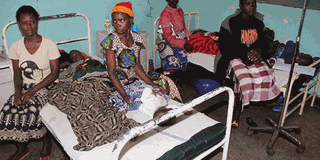Covid-19 has left women, girls in dire need of essential services

Overstretched hospital: Women sharing beds with their children in public hospitals is a common feature across Africa. With Covid-19, clinical management of sexual and gender-based violence cases and the availability, accessibility and affordability of menstrual hygiene products must be prioritized. PHOTO | POOL | NATION MEDIA GROUP
What you need to know:
- Coronavirus pandemic cases are increasing, not only in Rwanda but also across the globe, leaving millions of people, especially women and girls in dire need of the basic essential services such as food, clean water, safety and healthcare.
- Situations like Covid-19 pandemic typically have a disproportionately negative impact on girls and women.
- Global action is needed to contain the pandemic and ensure that care is available for everyone.
As the world grapples with the coronavirus pandemic, we are deeply concerned as the cases are increasing, not only in Rwanda but also across the globe. This has left millions of people, especially women and girls in dire need of the basic essential services such as food, clean water, safety and healthcare. From our work across the world, we have realised that situations like the current Covid-19 pandemic typically have a disproportionately negative impact on girls and women.
It is in such challenging times that many girls and women encounter rights violations and discrimination. It is therefore paramount that as we join hands with other actors in responding to the pandemic, we work together in making sure that essential services for children, especially girls, young people and women are always available.
We specifically advocate that girls’ and young women’s sexual and reproductive health and rights and menstrual hygiene must continue to be prioritized. Clinical management of sexual and gender-based violence (SGBV) cases and the availability, accessibility and affordability of menstrual hygiene products are critical services that must be prioritized.
As “lockdown” measures are being implemented for the effective management of the pandemic, they may trigger heightened social anxiety in the home and communities thereby resulting in increased parental frustration and different types of violence either toward children, or as part of intimate partner violence. Women and older girls are often the caregivers in a family and therefore have increased burden and exposure to infection should a family member be infected with Covid-19, knowingly or unknowingly.
The situation will be worsened if they do not have access to reliable sources of information on how to protect themselves and those in their care. Further, while the disease-related stigma will be high for everyone in communities, women and girls, due to gender norms and values are likely to face greater stigma within households and communities as seen in other outbreaks globally.
PUBLIC HEALTH AWARENESS
Considering the potential negative impact that comes with the effects of the pandemic, during and after, we commit to support in raising public health awareness through partnerships with various levels of government and partner organizations. Nonetheless, there is a need for effective and efficient coordination of all response actors, including those intervening in vulnerable communities such as refugee camps.
While we work on assisting communities in the current emergency, we continue to focus on the long-term by working with relevant stakeholders and the communities so that they can build their resilience to prepare, prevent, and respond to the impacts of not only public health issues like Covid-19 but other challenges that have previously existed such as SGBV and child abuse. We believe in a balanced approach where we need to respond to immediate needs like emergency food supplies while also focusing on other interventions in health, WASH, child protection, public engagement and education to have the highest impact on the prevention of transmission as well as mitigate against the psychosocial distress that can arise in pandemic situations. In situations like these, children and young people have an increased likelihood to adopt harmful coping mechanisms that induce higher stress levels for families and communities.
We also advocate for national and local authorities to ensure that planning and decision-making processes related to the response to Covid-19 strengthen the leadership and meaningful participation of girls and young women to ensure that their perspectives are heard, and needs are met.
Covid-19 will disproportionately affect the most vulnerable as it continues to spread around the world. Global action is needed to contain the pandemic and ensure that care is available for everyone.
This opinion was first published in Rwanda Today
The writer is the Country Director, Plan International Rwanda.




